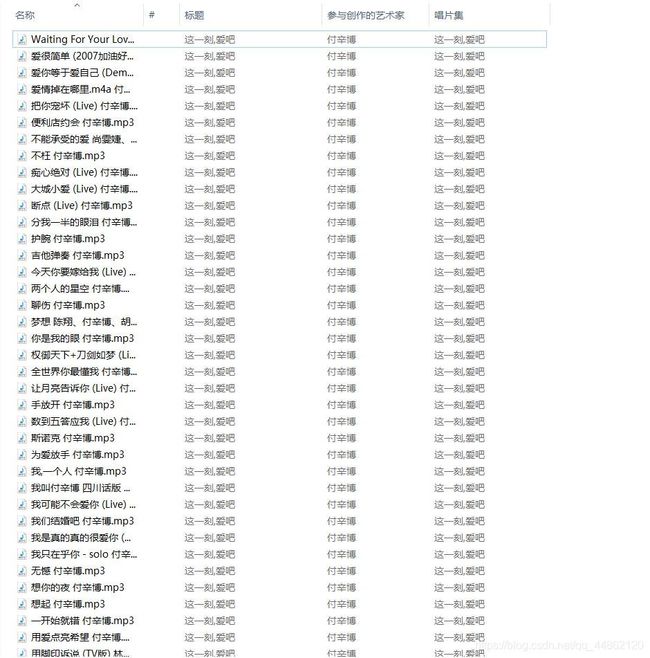爬虫项目实战十二:爬取酷狗音乐
爬取酷狗音乐并下载
-
-
- 目标
- 项目准备
- 项目分析
- 反爬分析
- 代码实现
- 效果显示
-
目标
爬取酷狗音乐,利用酷狗音乐api下载歌曲。
项目准备
软件:Pycharm
第三方库:requests,fake_useragent,selenium,re
网站地址:https://www.kugou.com/
项目分析
api接口:http://mobilecdn.kugou.com/api/v3/search/song?format=json&keyword=歌曲名或歌手名&page=1&pagesize=20&showtype=1
注:来源:https://blog.csdn.net/qq_32551929/article/details/87256150?ops_request_misc=%257B%2522request%255Fid%2522%253A%2522159730425319725211907849%2522%252C%2522scm%2522%253A%252220140713.130102334…%2522%257D&request_id=159730425319725211907849&biz_id=0&utm_medium=distribute.pc_search_result.none-task-blog-2allfirst_rank_ecpm_v3~pc_rank_v3-2-87256150.pc_ecpm_v3_pc_rank_v3&utm_term=%E9%85%B7%E7%8B%97%E9%9F%B3%E4%B9%90api&spm=1018.2118.3001.4187
这里歌手名输入:付辛博
打开看一下。

会发现就是该歌手很多歌曲名字,并没有看到有mp3类似的歌曲链接。这就得看如何使用api了。
打开浏览器,酷狗音乐搜索框输入付辛博。随便打开一首歌曲
https://www.kugou.com/song/#hash=C789A79D43105772F2783807A0D33B19&album_id=1740630
后面hash=和album_id=的东西在刚刚的api上都有显示。

![]()
这样就可以得到每首歌的链接地址了。只需拼接就OK。
然而获取连接还不够,还要得到每首歌的歌曲地址。

找到了,但是由于是动态JavaScript加载的,所以在源代码中根本找不到,这也是之前所遇到过的,而且酷狗音乐也采用各种加密方式,自己才疏学浅尝试好久依然搞不明白。只有采用selenium的方式获得歌曲源地址了。
反爬分析
同一个ip地址去多次访问会面临被封掉的风险,这里采用fake_useragent,产生随机的User-Agent请求头进行访问。
代码实现
1.导入相对应的第三方库,定义一个class类继承object,定义init方法继承self,主函数main继承self。
import requests
from fake_useragent import UserAgent
from selenium import webdriver
import re
class kugou(object):
def __init__(self):
self.url = 'http://mobilecdn.kugou.com/api/v3/search/song?format=json&keyword={}'
ua = UserAgent(verify_ssl=False)
for i in range(1, 100):
self.headers = {
'User-Agent': ua.random
}
self.driver=webdriver.Chrome()
def main(self):
pass
if __name__ == '__main__':
spider = kugou()
spider.main()
2.发送请求,获取网页。
def get_html(self,url):
response = requests.get(url, headers=self.headers)
html = response.json()
return html
3.使用api接口获取得到每首歌的网址。
def get_link(self,html):
content_list=html['data']['info']['singername']
for data in content_list:
singername=data['singername']
songname=data['songname']
album_id=data['album_id']
hash=data['hash']
filename=songname+' '+singername
print(filename)
link='https://www.kugou.com/song/#hash=%s&album_id=%s'%(hash,album_id)
self.parse_html(link,filename)
4.批量下载到本地。
def parse_html(self,link,filename):
self.driver.get(link)
new_html=self.driver.page_source
musics=re.compile('5.主函数及函数调用。
def main(self):
name=str(input("请输入歌曲或歌手名:"))
host=self.url.format(name)+'&page={}&pagesize=20&showtype=1'
end_page = int(input("要爬多少页:"))
for page in range(1, end_page + 1):
url = host.format(page)
print("第%s页。。。。" % page)
html=self.get_html(url)
link=self.get_link(html)
try:
self.parse_html(link)
except:
pass
效果显示
import requests
from fake_useragent import UserAgent
from selenium import webdriver
import re
class kugou(object):
def __init__(self):
self.url = 'http://mobilecdn.kugou.com/api/v3/search/song?format=json&keyword={}'
ua = UserAgent(verify_ssl=False)
for i in range(1, 100):
self.headers = {
'User-Agent': ua.random
}
self.driver=webdriver.Chrome()
def __del__(self):
self.driver.close()#运行完就关闭
def get_html(self,url):
response = requests.get(url, headers=self.headers)
html = response.json()
return html
def get_link(self,html):
content_list=html['data']['info']
for data in content_list:
singername=data['singername']
songname=data['songname']
album_id=data['album_id']
hash=data['hash']
filename=songname+' '+singername
print(filename)
link='https://www.kugou.com/song/#hash=%s&album_id=%s'%(hash,album_id)
self.parse_html(link,filename)
def parse_html(self,link,filename):
self.driver.get(link)
new_html=self.driver.page_source#获取源码可得到.mp3音乐地址
musics=re.compile('声明:仅作为自己学习参考使用。




